For biology graduates considering a career shift, the prospect of moving from the laboratory to the classroom presents an exciting opportunity. The transition from a biology-focused academic path to earning an education master’s degree and embarking on a teaching career is not only feasible but also highly rewarding. This article explores the potential advantages of this professional conversion, the unique value biology professionals bring to K-12 education, and practical strategies to ensure a smooth and successful transition.
The Unique Value of a Biology Background in Education
Biology professionals bring a wealth of knowledge and practical experience that can significantly enhance science education at the K-12 level. With their in-depth understanding of scientific concepts, research methodologies, and critical thinking, they are uniquely positioned to inspire curiosity and foster a love for STEM (Science, Technology, Engineering, and Mathematics) subjects among students. For example, their ability to connect theoretical lessons to real-world applications can make complex topics more accessible and engaging.
Moreover, their familiarity with laboratory work enables them to design hands-on experiments that align with curriculum standards while encouraging students to develop inquiry-based learning skills. According to STEM education on Wikipedia, such approaches are essential for preparing students for future scientific challenges.

Practical Steps for a Successful Career Transition
Transitioning from a biology-focused career to education involves several key steps. First, pursuing an education master’s degree tailored to science teaching, such as a Master of Arts in Teaching (MAT) or a Master of Science in Education (MSEd), is highly recommended. These programs often provide pedagogical training, classroom management skills, and student teaching opportunities that prepare candidates for the realities of K-12 education.
Additionally, obtaining relevant teaching certifications is crucial. Requirements vary by location, but most regions mandate passing standardized exams and completing a certain number of teaching hours. Networking with educators and joining professional organizations, such as the National Science Teachers Association (NSTA), can also provide valuable resources and mentorship.
Another important consideration is gaining classroom experience. Volunteering, substitute teaching, or working as a teaching assistant are excellent ways to build confidence and understand the dynamics of a school environment before fully committing to a teaching career.

Challenges and How to Overcome Them
While the transition from biology to education offers many benefits, it is not without challenges. One common hurdle is adapting to the demands of classroom management, which may feel unfamiliar to those accustomed to research settings. However, this can be addressed through targeted training and mentorship during teacher preparation programs.
Another potential difficulty is the shift in professional identity. Moving from a specialized, research-oriented role to a more generalist teaching position may require a mindset change. By focusing on the impact of their work—shaping young minds and contributing to the future of science education—biology professionals can find renewed purpose and motivation.
The Growing Demand for STEM Educators
The need for qualified science educators, particularly in STEM fields, continues to grow. According to the Education article on Britannica, there is an increasing emphasis on STEM education worldwide to address global challenges and drive innovation. Biology professionals transitioning into teaching can play a pivotal role in filling this gap, bringing their unique expertise to classrooms where it is most needed.
Furthermore, the interdisciplinary nature of biology makes it an ideal foundation for teaching various STEM subjects, including environmental science, health education, and biotechnology. This versatility provides biology professionals with diverse teaching opportunities across grade levels and educational settings.
In conclusion, the transition from a biology background to the education field is not only achievable but also deeply impactful. By leveraging their scientific expertise, pursuing targeted education training, and addressing challenges with resilience, biology professionals can make a meaningful contribution to K-12 education and inspire the next generation of scientists and innovators.
Readability guidance: This article uses concise paragraphs, active voice, and accessible language to ensure clarity. Transition words, such as “however,” “therefore,” and “in addition,” are integrated to enhance flow. Visual aids are strategically included to complement the text.


